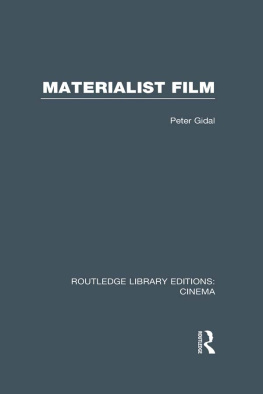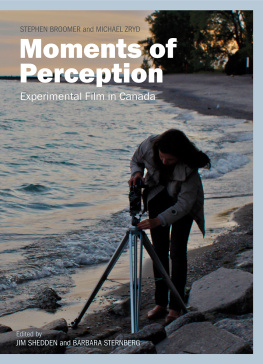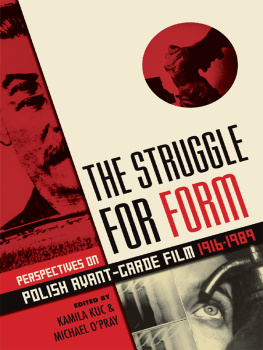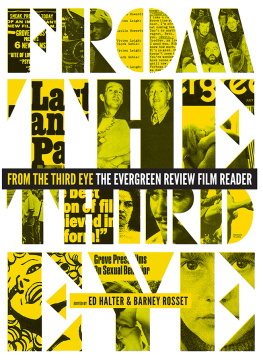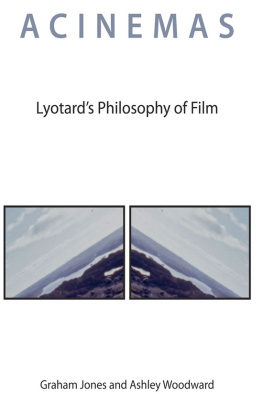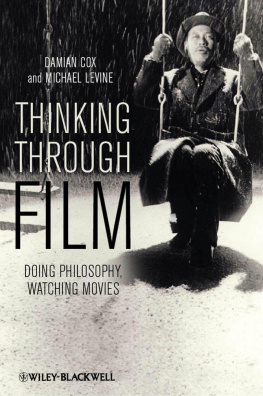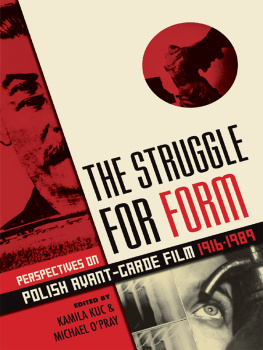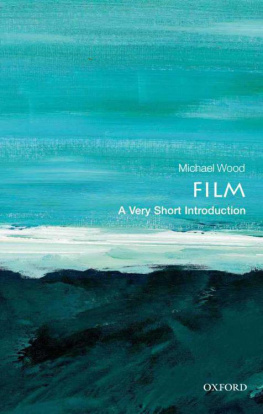ROUTLEDGE LIBRARY EDITIONS: CINEMA
Volume 13
MATERIALIST FILM
MATERIALIST FILM
PETER GIDAL
First published in 1989
This edition first published in 2014
by Routledge
2 Park Square, Milton Park, Abingdon, Oxon, OX14 4RN
Simultaneously published in the USA and Canada
by Routledge
711 Third Avenue, New York, NY 10017
Routledge is an imprint of the Taylor & Francis Group, an informa business
1989 Peter Gidal
All rights reserved. No part of this book may be reprinted or reproduced or utilised in any form or by any electronic, mechanical, or other means, now known or hereafter invented, including photocopying and recording, or in any information storage or retrieval system, without permission in writing from the publishers.
Trademark notice: Product or corporate names may be trademarks or registered trademarks, and are used only for identification and explanation without intent to infringe.
British Library Cataloguing in Publication Data
A catalogue record for this book is available from the British Library
ISBN: 978-0-415-83865-8 (Set)
eISBN: 978-1-315-85201-0 (Set)
ISBN: 978-0-415-72776-1 (Volume 13)
eISBN: 978-1-315-85204-1 (Volume 13)
Publisher's Note
The publisher has gone to great lengths to ensure the quality of this book but points out that some imperfections from the original may be apparent.
Disclaimer
The publisher has made every effort to trace copyright holders and would welcome correspondence from those they have been unable to trace.
Materialist Film
Peter Gidal
First published in 1989 by Routledge
11 New Fetter Lane, London EC4P 4EE
29 West 35th Street, New York NY 10001
Reprinted 1990
1989 Peter Gidal
Typeset by Columns of Reading
Printed in Great Britain
by TJ Press (Padstow) Ltd, Padstow, Cornwall.
All rights reserved. No part of this book may be reprinted or reproduced or utilized in any form or by any electronic, mechanical, or other means, now known or hereafter invented, including photocopying and recording, or in any information storage or retrieval system, without permission in writing from the publishers.
British Library Cataloguing in Publication Data
Gidal, Peter
Materialist film.
1. Experimental cinema films
I. Title
791.43
Library of Congress Cataloging in Publication Data
Gidal, Peter.
Materialist film / Peter Gidal.
p. cm.
Bibliography: p.
Includes index.
1. Experimental filmsHistory of criticism.
I. Title.
PN1995.9.E96G53 1989
791.43'01dc19 8815705
CIP
ISBN 0415003822
For Thrse Oulton
every thought, thought through
We stood still to see the other cleft of Malebolge and the other vain lamentings; and I found it marvellously dark.
(Dante, The Inferno)
When you say experimental film is about trying to understand the relationship between an object (in this case an image) and its name, how we come to know what we see, questioning the division of reality into discrete entities, what are you questioning about images? Images are not concepts, so how does one go about questioning them?
(Christine Delphy, Interview with Lisa Cartwright, Undercut)
Everything is optics.
(Nietzsche, Complete Letters)
Contents
Kurt Kren, Trees in Autumn (1960)
Germaine Dulac, Etude Cinmatographique sur une Arabesque (1929)
Peter Gidal, Condition of Illusion (1975)
Straub/Huillet, Accompaniment to a Cinematographic Scene by Arnold Schnberg (1975)
Mike Dunford, Still Life with Pear (1974)
Brecht, Kuhn, Doane, and Heath
Women against Violence against Women
Andy Warhol, The Chelsea Girls (1966)
Jean-Luc Godard, Two or Three Things I Know About Her (1966)
Peter Gidal, Room Film 1973
Dusinberre
Gill Eatherley, 1976
Malcolm LeGrice, 1978
Marilyn Halford, 1971
Malcolm LeGrice, Yes No Maybe Maybe Not (1967)
I owe an inestimable debt to Philippa Brewster who commissioned this book.
Special thanks are due to the filmmakers and theorists who have allowed such extensive quotation. Malcolm LeGrice, Lis Rhodes, Deke Dusinberre, Lisa Cartwright, Stephen Heath, Nancy Woods, and Mike Dunford deserve singling out. I am particularly grateful to Malcolm LeGrice for his generosity of spirit since 1968.
The stills are all published here courtesy of the filmmakers, whom I thank also for in many cases spending time and effort to print good photos.
I am grateful to David Curtis for allowing untrammelled rifling though his archives.
Without the continual work at, and of, the London Filmmakers Co-operative, no British experimental film since 1966 would have been possible. And there is currently a presence there of a dozen important new filmmakers whose films will have their effects in the 1990s. My thanks to the Film Co-op are beyond measure.
This book intends to theorize materialist film. It tries to utilize concepts that have been developed this century, in the interests of experimental filmmaking and thought. In doing so, it necessarily polemicizes certain positions and attempts to bring out specific uses in film, with the help of certain works of the avant-garde. The political positioning of the viewer is crucial in this, as is the knowledge that representation is real, is material, is politics and ideology, ideology the politics of meanings. Without a theory and practice of radically materialist experimental film, cinema would endlessly be the natural reproduction of capitalist and patriarchal forms.
I attempt in what follows to elucidate a series of concepts, tied to specific films in many cases, in a way that should allow the reader, by the time the book has been read, to deal with the issues and problematics that are produced by a materialist film theory and practice. None of this shall be without its problems.
The structure of the text is in chapters, but the chapters do not somehow lead seamlessly towards a conclusion. Instead, a series of concepts are dealt with point for point, and the order is simply one that may allow the reader to make some relations. To present such a series of examinations as if they were chronological or logical or empirically related in a temporal manner would be simply to academicize the exercise towards the illusion of fulfillment. This would go against the meaning of the project. If anything, the series of adumbrations must be utilized not via some pure objectivity of knowing and not via some notion of individual subjectivity's truth. And certainly not via some free and democratic series of possibilities. Rather, bear in mind that the concepts do not appear in a vacuum, nor stem from one. It is a matter of things and concepts in constant dialectic material struggle in certain interests. How they are used is another matter.
Looking through the Table of Contents ought to give an immediate insight into the obviousness of what has been written so far.
I am using many long quotes in this text; the reason is that paraphrasing is tedious for reader and writer, and paraphrasing manages to take what polemical/theoretical/political power there is in writings and make it (them) somehow part of something else. Instead, these chapters (hopefully) engage with many of the meanings that are quoted or simply allow their force to persist. This may demand that the reader puts up with some difficulties in the process of reading/thinking, which is as things should be (and are).
Next page
